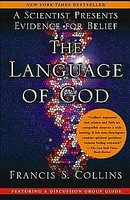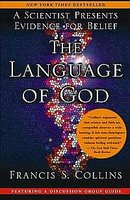 Previously, on No Moods, Ads, or Cutesy Fucking Icons...
Previously, on No Moods, Ads, or Cutesy Fucking Icons... Many religious people are idiots. My Dad's religious, but he's no idiot. There are some other smart religious people out there too. Maybe they're right and I'm wrong. But they can't be, because I'm a scientist and they're not! But real scientists have to allow for the possibility that they can be wrong about anything; otherwise they're just another breed of fundamentalist. Oh, look, here's a scientist called Francis Collins. He is much smarter, more prominent, and way better-paid than I ever was. He says I'm wrong. He says he has evidence for the existence of the Christian God. He uses many scientific-sounding words to convince me he might be on to something.
Teach me, Francis Collins, Director of the Human Genome Project, arch-nemesis of the evil Craig Venter! Show me the way!
Here it is. Dr. Francis Collins' Big Reveal. Actually, his Big Reveal was a personal epiphany he had while looking at a bunch of icicles; this is his Evidence That Demands A Verdict, and it is, wait for it:
The warm fuzzy feeling you get when you "Do The Right Thing".
Yup. That's it. A dopamine rush, elevated to the status of "The Moral Law". Universally extant in every Human culture, he says, and unique to Human culture as well. "Evolution will never explain The Moral Law and the Universal Search for God", he assures us, will never explain that uniquely, universally human urge to help those in need, even if they don't share our genes, even at our own expense. We are beyond evolution — for if the evolutionists were right, we'd never do anything except selfishly try to spread our own genes. Collins actually uses the word "scandal" to describe the way in which we "evolutionists" regard altruism.
He invokes C.S. Lewis's faux-adaptationist argument to induce God's existence from these warm fuzzies:
"Creatures are not born with desires unless satisfaction for those desires exists. A baby feels hunger; well, there is such a thing as food. A duckling wants to swim; well, there is such a thing as water. Pedophiles feel sexual desire; well, there is such a thing as alter boys*. If I find in myself a desire which no experience in this world can satisfy, the most probable explanation is that I was made for another world."
After which Collins cuts in and asks "Why do we have a 'God-shaped vacuum' in our hearts unless it is meant to be filled?"
Where to start. (Beyond noting that while some sort of vacuum does seem to persist in one Francis Collins, it is unlikely to reside in his thorax...)
Let's start with a general observation. Collins' understanding of natural selection appears to be a woefully-ignorant caricature in which every organism always behaves optimally to promote its own fitness, and every instance in which this doesn't happen constitutes a failure of evolutionary theory calling out for Divine intervention. What he doesn't seem to understand (or perhaps, what he's hoping you won't) is that the whole basis of natural selection is variation. Organisms differ; some do better than others; the losers leave fewer offspring. Nature, in other words, is chock-full of creatures who do not selfishly spread their genes, who benefit others at their own expense. Conspecifics might call such organisms "unsuccessful competitors". Parasites would call them "hosts". Predators would call them "food". The Archdiocese calls them "parishioners".
Perhaps you're thinking that's a cheap shot; prey may not successfuly spread their genes, but that's not for want of trying. I would counter that the same could be said of all those good folks who turn the other cheek expecting a grand payoff in the Kingdom of Heaven. Either way, this Collins guy needs to be taught the basics — not just of biology, but of elementary logic. To claim that non-selfish acts contradict evolutionary theory is like claiming that blow jobs contradict the orgasm's role in reproduction.
But fine: he's talking about the knowing and voluntary sacrifice of one's own interests to benefit another. That's what he defines as uniquely human. Except it isn't. Empathy for nonrelatives, efforts expended to help others (even members of different species), have been documented in nonhuman primates and cetaceans. The concepts of fair play and justice don't seem to be uniquely human either. Contrary to Collins' claims, sociobiologists don't have any real trouble reconciling such actions with evolutionary processes; in fact, the neurochemistry underlying empathy is a pretty basic social-cohesion mechanism. And while Collins has a field day hauling out Oskar Schindler and Mother Theresa as examples of selfless service to a greater good, he's only cherry-picking one or two convenient outliers from a cloud of data. Readers of this obscure little newscrawl may remember that there is a data cloud, statistically quantifiable, and it shows that people tend to engage in risky heroics or acts of altruistic generosity primarily when it improves their chances of getting laid. (And don't bother pointing out that Mommy Theresa's chances of that were pretty much nil — we both know the basement circuitry works the same way regardless of motivational overlays. Besides, she was expecting a whole other kind of payoff, just as Schindler more likely than not feared some kind of payback.) You may also remember that this "Moral Law", such as it is, is inconsistent and often downright wrong, that the truly altruistic — those who'd unhesitatingly sacrifice two of their own children to save four of someone else's, for example — suffer from a specific and precise form of brain damage. The truly moral are those with lesions in the ventromedial prefrontal cortex; not, so far as I've heard, a "universal" aspect of the Human condition.
And that's not even getting into the self-sacrificing behaviour of those who have merely been tricked into furthering someone else's agenda. How many Christians would have marched in the Crusades, how many jihadists would have strapped bombs across their bellies, how many missionaries would have risked disease and death in darkest Africa if they'd actually believed that eternal damnation was waiting at the end of it? (Now that would be altruism.) Is Collins really so blind to the workings of his own religion that he can't tell the difference between true selflessness and the manipulation of selfish motives by parasites wielding imaginary payoffs?
Which leads to another, and mind-bogglingly obvious failing of Collins' argument: the ubiquity of the "Moral Law". His claim that we all share the same standards of right and wrong would, I expect, come as news to all those cultures throughout history who kept (and keep) slaves, who mutilate the genitals of their women, who regarded (and regard) foreign races, beliefs, and behaviours as things to be avoided at best and hammered into extinction at worst. The ongoing genocides of the twentieth and twenty-first centuries provide eloquent testimony to the ubiquity of Collins' Moral Law, and while he leaves himself a bit of wiggle room (we all have the Moral Law, you see, but some of us choose to ignore it), he cites nothing to justify the claim that this sense of right and wrong is universal beyond the one-two punch that a) he feels it and so do all his friends, and b) C.S. Lewis told him so. (In fact, reading The Language of God, you get the sense that Francis Collins has anointed himself C.S. Lewis's Official Corporeal Sock Puppet.)
For all his talk of agape and altruism, Collins may be the most profoundly self-centred human being I've read. The possibility that everyone doesn't feel just the way he does seems completely beyond his grasp.
The search for God? I'm a pretty introspective dude, and I can say with a high degree of confidence that I don't have anything like that gnawing away inside me. I recognise that many people do— but I also recognise that our brains are hardwired to see patterns even where none exist, to attribute agency even to purely indifferent phenomena. It's a small enough step from the "Theory of Mind" that allows us to suss out the agendas of the creatures and conspecifics we encounter day to day. So the very clouds can look angry to us, or benign; and who hasn't wanted to put a brick through that fucking laptop and its fucking Blue Screen of Death which always, malevolently, crashes your system when you're six hours from deadline and have forgotten to save?
Apply equal parts ignorance, pattern-matching, and the attribution of motives onto nature's canvas: angels and demons sprout like Spears sprogs behind every rock (much as they appeared to Collins in his frozen waterfall). But Collins doesn’t even admit that such neural circuitry exists, much less contemplate its potential relevance to human superstition. No mention at all of Persinger's work, or Ramachandran's. Not a word about the brain's God Module. And once again, no credit whatsoever to the guys with the mitres and crosses — not to mention the iron maidens in their basements — and the role they might have played in inculcating a sense of the divine into the culture (albeit granted, a form of the Divine that seems chronically in need of alms).
So Collins' central, most rigorous argument for a personal god — who created heaven and earth and made us and only us in his image — is that everybody shares the same sense of right and wrong (except they don't); that everybody seeks God (speak for yourself, buddy; I'm happy if I can just find a decent pint of Rickards); that Human beings are unique among all species in being altruistic and moral (except we're not); and that there's no other explanation but the God of Abraham for any of this (except there sure as shit is).
Let me repeat: this is his strongest argument.
It's not his only one, though. Collins commits numerous other sins, easily recognised by anyone with even a passing familiarity with the moves of flat-earthers and climate-change deniers and spin-doctors the world over. Statements initially introduced with all the right caveats ("If we accept the possibility of the supernatural, then it is possible that...") reappear later, unsubstantiated but nonetheless miraculously transmuted into statements of absolute fact (believers are "right to hold fast to the eternal truths of the Bible"). Legitimate objections to his positions (e.g., that religious beliefs are irrelevant to the study of Nature) are dismissed for no better reason than that Collins finds them unpalatable ("that doesn't resonate with most individuals' human experience", he writes). In the manner of fundies everywhere, and in the spirit of that book he holds most holy, he contradicts himself whenever it suits him. At one point he argues against the God-as-wishful-thinking model by pointing out that a product of wish-fulfillment would be cuddly and indulgent, not demanding and judgmental as the God of Abraham is wont to be. (Oddly, the prospect of an intimidating God invoked not for comfort, but as a way for folks in funny hats to exert control over credulous followers, never seems to occur to him.) But when facing off against those who'd claim that God scattered photons and fossils across heaven and earth to test our faith, he decides that a little wishful thinking is just fine: "Would God as the great deceiver be an entity anyone would want to worship?"
He rejects a naturalistic universe because after all, something had to kick-start the Big Bang (it couldn't have just booted itself, that would be silly) — then changes the rules to exempt his own model from the same criticism (oh, nothing had to create God, God just booted Himself). (As I would too, hard in my own ass, if I'd created a sentient being as wilfully stupid as Francis Collins). He hauls out the old atheism-is-faith-based-too chestnut, because after all, nobody can prove God doesn't exist, so if that's what you believe you're just taking it on blind faith, right? (Of course, nobody can prove that omnipotent purple hamsters aren't partying it up in the Pleiades either; I guess Collins must believe in those too, or he'd be just as blind as the creationists.)
He quotes Hawking's Brief History of Time out of context, in a way that portrays ol' Wheels as a believer; he makes no mention of Hawking's explicit denial of religious belief in the same book. He tries to tell us that creationism and Intelligent design are different things, and goes so far as to state as a scientist that the ID movement "deserves serious consideration" — evidently unaware that the IDiots got caught passing their creationist textbook through a global search-and-replace to turn every instance of the word "creationism" into "intelligent design", as a way to get around legal proscriptions against religion in science class.
I don't care if this guy did nail the gene for cystic fibrosis. If this book exemplifies his cognitive skills, I gotta wonder who he slept with to end up running the HGP.
Once, many years ago, Francis Collins claims he was an athiest. Maybe he still is, at heart. Maybe he's just lying through his teeth with this book. Maybe he's a player with an agenda, a guy who wanted to climb up the ranks and figured that atheism would keep him off the guest lists for all the best parties. I have no evidence of this, but I hope that's the case. I hope that he's merely an opportunist. I really do.
Because judging by this self-righteous, irrational, and contemptible book, the only other explanation that comes to mind is that Dr. Francis Collins is a fucking moron.
(edited for style 22/12/07)
*Okay, maybe Lewis didn't use this particular example. But you take my point. NAMBLA's gonna have a field day with this rationale; according to Francis Collins, God wants them to be pedophiles...
Labels: ass-hamsters, rant, sociobiology
















